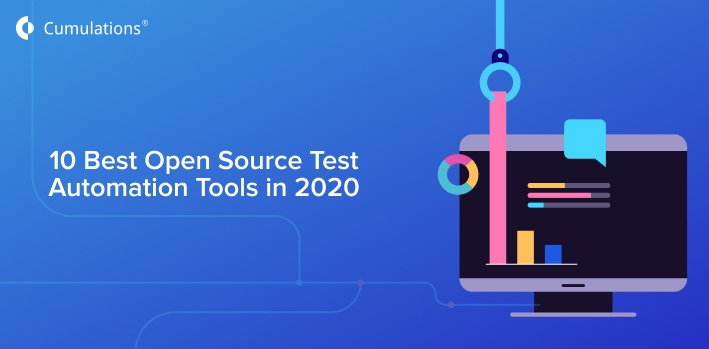
The open test automation tools are the advent of new trends and technology imbibed within the software industry. Because it is necessary to improve on aspects like customer satisfaction, productivity, and quality, the use of the Open Source Test Automation Tools are increasing. Solutions like DevOps and Agile can be used to attain the benefits. The use of the best test automation tools is crucial and essential in DevOps, and these tools can also apply machine learning (ML) and artificial intelligence (AI). Testing tools also support automation evaluation and can be chosen on criterion including whether they possess AI or ML capabilities, their strength in supporting service and API testing, and their maturity and popularity.
10 Open Source Test Automation Tools
1. Ranorex
The comprehensive set of tools of Ranorex Studio offers capabilities and features, including an open API, full IDE, and convenient no-code automation. The latest mobile/web technologies, as well as the legacy applications, can all be tested through automation through the use of one of the best open-source test automation tools. The DIE is optimized for the creation of Web UI tests. Ranorex can scaffold the test framework, and the integrated Ranorex velocity provides for the production of selectors. The test is fast, and the use of the tool provides for resource maximization, quality, and higher test coverage.
2. Selenium
Selenium is one of the most popular and efficient Open Source Test Automation Tools available today. It can automate the web applications so that accurate tests can be carried out speedily, and it also automates web-administration. Selenium web driver helps you rate the regression automation test models, which can also be distributed to other environments. Selenium Grid can be used to run and distribute tests on multiple machines and different browsers and operating systems. The tools have the in-built issue tracker, which provides for faster and convenient testing. Selenium can be used for testing the compatibility of the online browsers, locally-hosted pages, screen size responsiveness, and display resolution.
3. Katalon Studio
The test automation tool can be used for testing Web, APIs, mobile and desktop applications, and also supports OS, including Linux, Windows, and macOS. The tests are codeless for the beginners and experts can take advantage of features including customization and endless script extensions. The tool is integrated with CI tools, including Circle CI and Azure, among others. The integrated tool offers convenience to all developers, including those who want to use Appium and Selenium. The built-in keywords, support for RESTful and SOAP (for testing APIs), BD cucumber, and a capability for extension are other good capabilities of the test tool.
4. Lambda Test
Lambda Test is useful for automated cross-browser testing on more than 2000 browsers and operating systems, and screens with different resolutions. The capabilities of the Lambda Test include visual regression testing, visual cross-browser testing (with the auto-generated screenshots), integrated debugging, and geo-location testing, among others. It can test the website’s responsiveness to mobile devices as well.
5. Test Complete
The test automation tool has comprehensive and powerful features, including desktop, web, and mobile application testing. Multiple languages, including Python, VB Script, and C++ can be used for writing tests. It is the first tool that has features, including a hybrid object visual recognition engine that also supports AI. The Intelligent Recommendation System and feature helps all develops avoid the maintenance headaches of their tests. The speed of tests is apparent, which comes through the record and replay functionalities and the customizable object repository.
Must read: Top 10 Mobile App Testing Tools for Android & iOS
6. Robot Framework
The open-source tool can be used for test automation, and RPA or robotic process automation as well. Extensions are also available, and the tool integrates well with multiple tools for creating flexible and scalable test solutions. Some of the things to be liked on the Robot framework include the utilization of the human-readable keywords and easy syntax. Other features include clear reports, detailed logs, tabular syntax, and test cases that are driven by data.
7. Soap UI
The test Automation tool Soap UI accelerates the API tests through its “point and click” and “drag and drop” facilities and capabilities. The standard interface tool helps developers run the tests from all task schedulers, and the tests can also be integrated within the build process. There is support for SOAP and REST services, and both open-source and pro (paid) versions are available. Some of the features of the tool are:
• Reusability of scripts
• Asynchronous and data=driven testing
• Creation of mock services
8. HPE Unified Functional Testing (UFT)
The tool is one of the best automation tools for developers who wish to perform testing on multiple tasks. It also works swiftly in different development environments and on different browsers. UFT tool can test all apps, including those built for Windows, IOS, and Android. It integrates with Jenkins and the other capable app development tools. The API testing tools help in the evaluation of load performance and functionally of APIs of the app that is being tested. UFT is good for the web/mobile/complex desktop applications that run on multiple operating systems. The continuous integration capability and the collaboration tools are built in the test system.
9. IBM Rational Functional Tester
The multiple capabilities of the testing tool from IBM include capabilities like functional testing, automated regression testing, GUI testing, and data-driven testing. The “Storyboard” testing features provide for simple processes of test creation and visualization. The two languages supported here include Java and VB.Net. The tool has the “keyword testing” feature through which automaton can be easily streamlined. Another remarkable feature is the “dynamic data validation,” wizard, which can validate the data swiftly.
10. Cucumber
The test tool supports BDD or Behavior-driven Development, and the tests written through it can be easily understood, with no specific technical language required. Documentation created can be easily shared, and Cucumber also improves collaboration between the technical people and businesses. BDD includes small yet rapid iterations that provide for better flow and feedback. The framework provides better automation and development as the BDD specifications work well when used for automated tests as well. The Gherkin editor is built-in and does a great job of empowering all team members.
The Open Source Test Automation Tools are quite essential and imperative, and all developers involved in testing can use them for a convenient, speedier and efficient testing process that can be carried out in the least steps. All the tools mentioned above are some of the very best in the realm.
Related read:
1. Testing Development Setup for iOS Applications in major startup companies


 +91-984-5825982 | +91-996-4689921
+91-984-5825982 | +91-996-4689921 sales@cumulations.com
sales@cumulations.com Send your requirement
Send your requirement 



